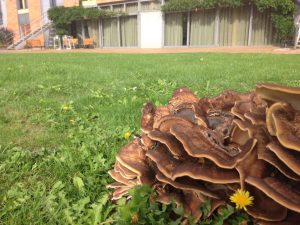Food security, Biosecurity and Trade; the role of plant health
It was a long week. Long, but hugely rewarding. It all kicked off with an early morning train to Oxford and an extended bike ride around this wonderful city as some wrong turns were taken on the way to St. Hugh’s College, University of Oxford; the conference venue.
Here the British Society for Plant Pathology hosted their annual two-day Presidential Meeting. For the remainder of the week their Interdisciplinary Study Group: Grand Challenges in Plant Pathology kept me busy.
The meeting was perhaps my favourite one to date with a whole host of highly relevant topics covered by a great mixture of established and early-career researchers. I presented ‘Increasing accuracy of powdery mildew identification using previously untapped DNA regions’ amongst a strong field competing for the PH Gregory award. This was one by Douglas Pyott who works on engineering Arabidopsis using CRISPR techniques.
Talks took in elements of modelling, disease resistance, diagnostics, and various breeding techniques in order to limit disease and sustain a well nourished human population in the future. Particularly inspiring were Fenton Beed of the World Vegetable Centre and Nicola Spence of DEFRA. Fenton spoke of the need for a change in psychology to address ‘nutrient-starved’ nations rather than simply those which are ‘calorie-starved’. We must therefore consider how to balance the scales between obese, developed nations and starved, developing nations. Nicola’s job involves limiting the flow of plant diseases entering the country through trade, and other methods. Her presentation therefore highlighted the role science had to play in this as we develop detection techniques and scan the horizon for the next potential dutch elm disease or ash dieback.
The Society had invited local school children to take part in the conference as part of the Damaging and Deadly outreach. So myself, Douglas Pyott, and Sarah Gurr were recruited to give them a brief overview of ourselves, our passions, and our science. Events such as this are key for inspiring the next generation of plant pathologists and this was a relaxed and rewarding end to the day for all involved.




Pingback: Grand Challenges in Plant Pathology Interdisciplinary Study Group | Culham Research Group